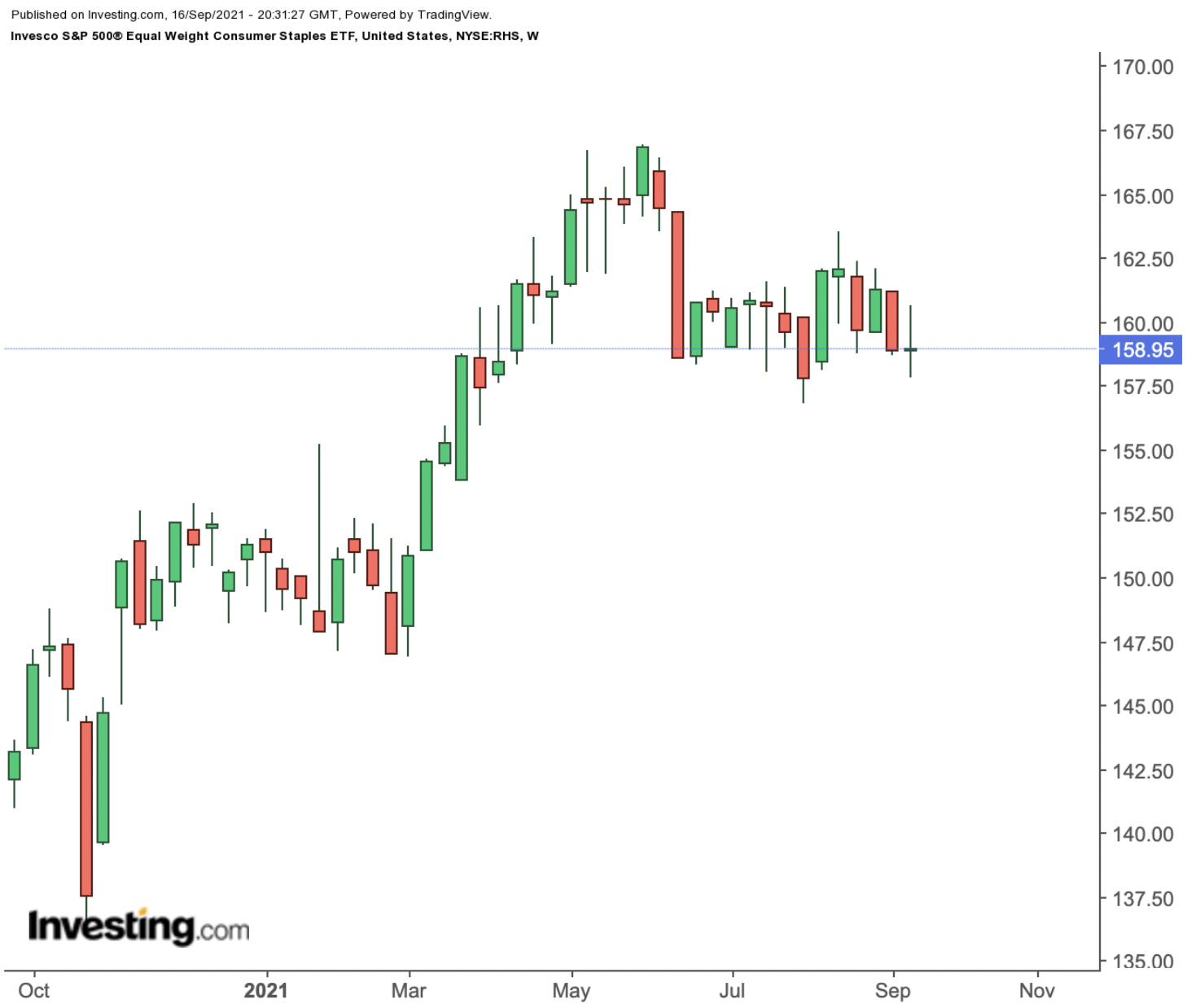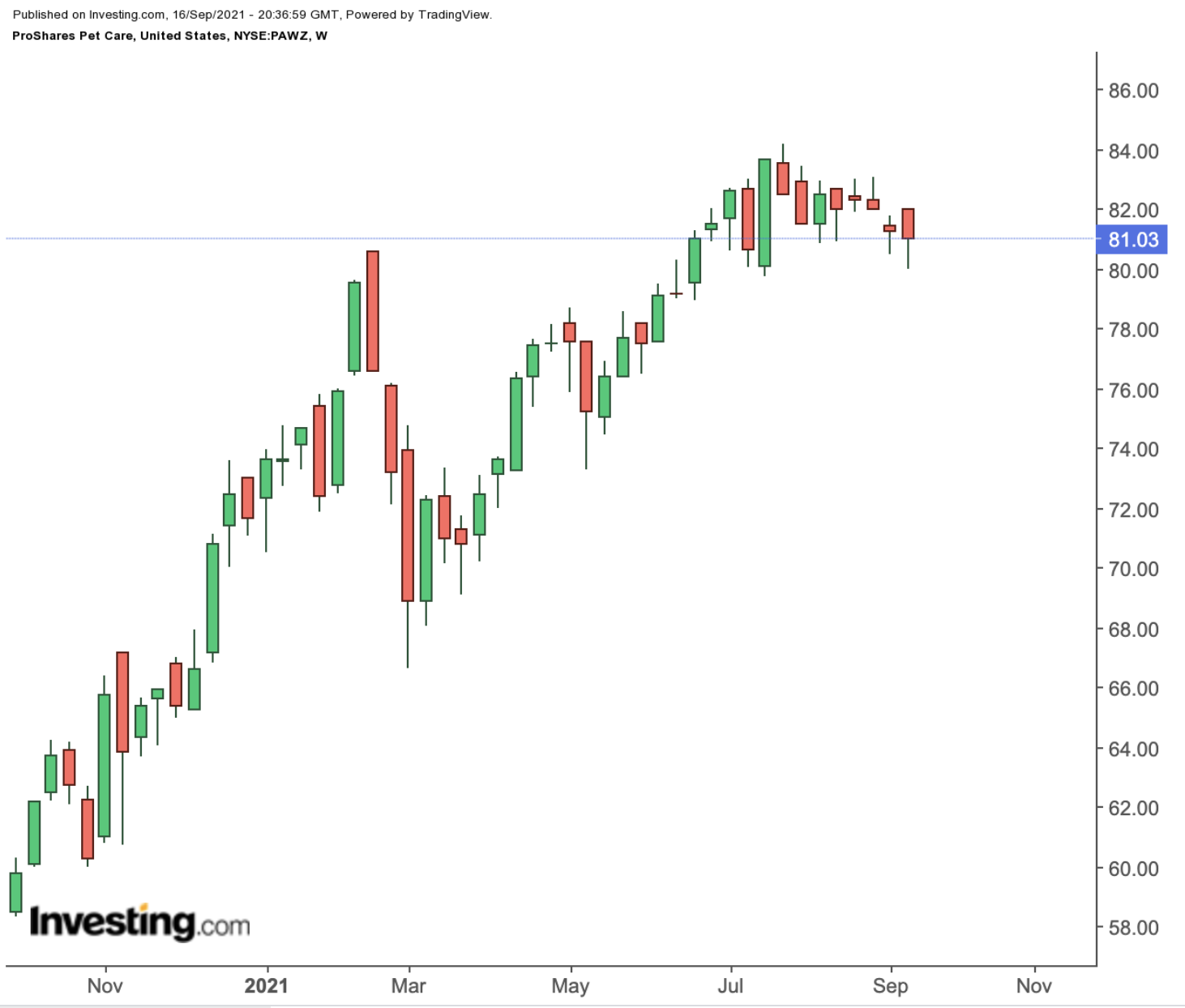So far in 2021, consumer spending in the U.S has been strong. According to the metrics released Aug. 31, the Consumer Board Consumer Confidence Index was “113.8, down from 125.1 in July,” the lowest level since February 2021.
The Federal Reserve Bank of St. Louis highlights that consumer spending accounts for close to 70% of the U.S. economy. Therefore, Wall Street pays attention to the health of the consumer. Today, we discuss two exchange-traded funds (ETFs) that focus on the consumer. They might appeal to readers who believe the U.S. consumer will continue to spend in the rest of the year.
1. Invesco S & P 500 Equal Weight Consumer Staples ETF
Current Price: $158.95
52-Week Range: $136.54 - $166.95
Dividend Yield: 1.96%
Expense Ratio: 0.4% per year
The Invesco S&P 500® Equal Weight Consumer Staples ETF (NYSE:RHS) invests in consumer staples stocks in the S&P 500 Index. The fund started trading November 2006.

RHS currently has 33 holdings. The top 10 names comprise about a third of net assets of $468 million. In terms of sectors, we see food products (38.55%) followed by beverages (18.543%), food and staples retailing (16.67%) and household products (16.17%).
Leading names in the roster include the membership warehouse Costco Wholesale (NASDAQ:COST); food retailer Kroger (NYSE:KR), cosmetic and beauty products manufacturer Estee Lauder (NYSE:EL); as well as global consumer products giants Kimberly-Clark (NYSE:KMB) and Procter & Gamble (NYSE:PG).
The fund returned 9.6% in the past year, and saw a record high in June. Forward P/E and P/B ratios stand at 18.78x and 4.29x, respectively.
As most long-term investors would concur, consumer staples form a part of the defensive category of the broader market. This means these businesses offer products or services that are considered “musts” rather than “wants.” For that reason we like the sector, as well for the diversity it offers. In the case of a short-term decline, potential investors would find better value around $150.
2. ProShares Pet Care ETF
Current Price: $81.03
52-Week Range: $55.19 - $84.20
Dividend yield: 0.18%
Expense ratio: 0.5% per year
About two-thirds of U.S. households own pets. And recent metrics show that in 2020, they spent $103.6 billion on their much-loved animals. In 2019, they spent $97.1 billion. Analysts expect the number to reach $109.6 billion in 2021. The amount includes pet food, supplies, medical treatment, insurance, training and pet care.
The ProShares Pet Care (NYSE:PAWZ) allows investors to capitalize on consumers’ love for their pets. The fund invests in businesses that benefit from an increase in pet ownership.
The fund was first launched in November 2018.

PAWZ, which has 32 holdings, tracks the returns of the FactSet Pet Care Index. The leading 10 names make up about 68% of net assets of $323.5 million. In other words, the fund is top heavy.
In terms of sectors, we see veterinary pharmaceuticals (21.06%) followed by veterinary diagnostics (14.53%), internet pet and pet supply retail (12.55%), pet and pet supply stores (9.45%) and others.
Around two-thirds of the businesses are based in the U.S. Next in line are companies from the UK (16.19%), Switzerland (4.56%), Germany (4.06%) and France (2.10%).
Among the top stocks are Zoetis (NYSE:ZTS), which manufactures medicine for pets and livestock; Idexx Laboratories (NASDAQ:IDXX), which focuses on veterinary as well as water markets; UK-headquartered Dechra Pharmaceuticals (OTC:DPHAY) ; online pet supplies retailer Chewy (NYSE:CHWY); Freshpet (NASDAQ:FRPT), which makes fresh pet food; and consumer foods heavyweight Nestle (OTC:NSRGY).
PAWZ returned 12.1% in 2021 and saw a record high in late July. Trailing P/E and P/B ratios of 40.00x and 6.87x are overstretched.
In the case of short-term profit-taking, the ETF could come under pressure. Interested readers could regard $78 as a better entry point. Most analysts concur long-run trends for the industry are rosy worldwide.
